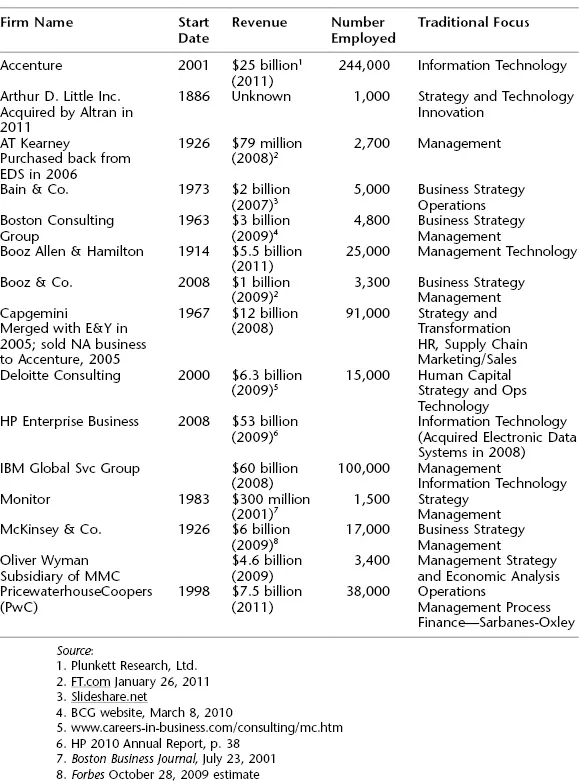![]() PART ONE
PART ONE
SETTING THE STAGE![]()
CHAPTER ONE
THE NATURE OF CONSULTING
Consulting has become an important source of employment and professional satisfaction for tens of thousands of people in the United States and around the world. Despite the industry downturn in 2009, according to the U.S. Office of Personnel Management and the Association of Management Consulting Firms, major consulting firms continue to expand their global reach as well as their areas of consulting practice. It would appear that this $350 billion global industry will remain an attractive career for many years to come (Top-consultant, 2011; U.S. Department of Labor, 2006). Consulting is a large and vital industry. A hundred years’ growth in the consulting industry indicates that clients have valued the services provided by consultants. Indeed, consultants have been a powerful force in shaping and influencing the very market they have pursued. Yet with its size and scope, the consulting industry could benefit from some close examination if it is to enjoy a second hundred years in the face of technologies that are changing the way information and advice are delivered.
This chapter lays out the nature of the industry as well as some of its major issues and challenges:
- Scope of the industry
- Types of consulting
- Concept of the trusted advisor
- Consultant qualifications
- Professionalism in the industry
Thus the chapter sets up and summarizes the main themes of this book: the values, knowledge, skills, and professional behavior needed by new consultants to the industry.
It’s an Industry
Thousands of business consulting firms, ranging in size from one-person operations to perhaps a dozen people, have emerged over the last twenty-five years across the United States and around the world. Their consulting ranges from executive coaching and leadership development to advising on how to build and run a corporate learning academy; from corporate social responsibility and crisis management to sustainability, security, and integrating technology systems; from business turnarounds to personal financial planning. Consultants in “think tanks” such as the Brookings Institute, Rand Corporation, Cato Institute, American Enterprise Institute, Heritage Foundation, and the Hudson Institute conduct research and offer advice on a comprehensive range of international and domestic issues. In addition to the global consulting companies and research institutions, many self-appointed individuals travel the world offering advice on a wide range of business and personal effectiveness problems. Finally, since the 1950s, the industry has also included professors from university business schools who have consulted to business and industry on a plethora of management and executive education topics (Verlander, 1986). Christopher McKenna (1995), a historian of consulting at Oxford University, explains that management consulting has been around for more than a hundred years. First there were the big consulting firms, such as Arthur D. Little (founded in 1886), Booz, Allen & Hamilton (1914), A. T. Kearney (1926), McKinsey (1926), The Boston Consulting Group (1963), Capgemini (1967), and Bain & Company (1973), followed by a tidal wave of small, specialized boutique firms that hired MBAs and trained them in their methods and procedures to be first-class strategy and business consultants. The big accounting firms had developed their own management consulting units early in the twentieth century and believed—until recently—that using their audit and tax client base they could leverage those relationships to build management consulting and information technology (IT) consulting practices. But in the 1980s and 1990s this produced internal management conflicts, as the revenue from consulting in those firms started to exceed the audit revenue, and conflicts of interest, as the Enron, WorldCom, and Tyco scandals put their independence into question. According to McKenna:
In 1998, the Big Five (accounting firms) employed more than 65,000 consultants and billed more than $12 billion annually. By 2002, four of the five largest consulting firms had new names and new owners: Anderson Consulting had become Accenture; Ernst &Young Consulting was bought up by Cap Gemini, PricewaterhouseCoopers Consulting was sold to IBM, and finally KPMG Consulting became a publically traded company and renamed itself BearingPoint. In the end, only Deloitte Consulting … remained attached to a leading international accounting firm.
(McKenna, 2006, p. 238)
Perhaps the most recent large shift in business models for technology companies is that of IBM. From its origins as the leading manufacturer of IT hardware, the company now produces most of its revenue from consulting services (2007 pretax earnings: software 40 percent, services 37 percent, hardware/financing 23 percent). IBM competes with Electronic Data Systems (EDS, acquired by Hewlett Packard in 2008), and Microsoft, which has operated its own consulting services division since 1995.
Since the 1970s there has been a rise in the number of consulting companies devoted to and specializing in such areas of consulting as human resources benefits, organization development and training, and what might more broadly be called change management consulting—helping clients to build learning organizations, employee development systems, and leadership development strategies. Many management consulting firms have a practice in technology consulting, as it is such a rapidly growing area of business development and profits.
As Table 1.1 shows, however, management consulting firms generally specialize in something other than technology and have built their reputations and fortunes in the strategy and organizational change areas of practice. They have built formidable, high-quality client bases in health care, government, business, and education, and include Oliver Wyman (formerly Mercer Delta), Mercer Consulting, A.T. Kearney, The Forum Corporation, AchieveGlobal, Dale Carnegie Corporation, HayMcBer, FranklinCovey, and the now defunct Harbridge House. All of the traditional accounting firms (McKinsey started as one)—such as KPMG, PricewaterhouseCoopers (PwC), and Ernst & Young—divested their consulting practices, except Deloitte & Touche (which recently dropped Touche from its brand name), which continues to offer a range of management consulting services. KPMG’s divestiture became BearingPoint, which in 2009 liquidated and ceased its operations.
TABLE 1.1 LEADING CONSULTING FIRMS
The particular field of management consulting grew, by some estimates, over 20 percent during the 1980s and 1990s. Unlike other parts of the broader professional services industry, it tends to be cyclical and linked to overall economic conditions. Although figures vary, it is clear that the consulting industry declined along with the general North American and global economy. For example, according to Plunkett Research (2009), the consulting industry shrank during the 2001–2003 period but has been growing slowly since. Ibisworld (2012) reported that the consulting industry declined by 2.6 percent in 2009 and fell another 3.5 percent in 2010. And according to the Economist, during the Great Recession of 2008–2009 the consulting industry experienced a severe reduction in client work, with a corresponding trimming of fees, cuts, or contract delays. In 2009 the global consulting industry shrank by 9.2 percent, the worst year since 1982 (“Advice for Consultants,” 2011). Add to this the fact that Marsh & McLennan reported a 10-percent drop in consulting revenues; McKinsey and BCG held back bonuses; McKinsey and Bain suffered a slight drop in revenues; Marakon was bought by CRA International; Katzenbach, after shrinking in 2009, was saved by Booz; accounting firms with consulting practices—PricewaterhouseCoopers and Ernst & Young—had a 7-percent drop in revenues; and Towers Perrin and Watson Wyatt merged, as human resource consulting was hard hit.
In Britain, human resources consulting fell by 20 percent (“Laid Off Lawyers,” 2010) but recently in Germany, Munich-based strategy consultants Roland Berger (2009 revenues of €616 million) declined to merge with Deloitte Touche Tohmatsu consulting services (which had 2009 consulting revenues of $7.5B), preferring to remain independent. In 2002 PwC sold its management consulting practice to IBM. Interestingly, Deloittte remains the only one of the “big four” accounting firms to retain its strategy consulting arm in the wake of the Enron scandals a decade ago (“Roland Berger,” 2010).
Adapting to their economic realities, global consulting firms shifted their strategies to include the emerging Brazilian, Russian, Indian, and Chinese economies, as the United States and European markets came under downward pressure. However, this decline has been relatively short-lived, as small, nimble firms have found ways to compete, and as the growth rates in Table 1.2 show, the world’s top consulting firms have bounced back. Reflecting the resilience of the industry, firms in 2010 started to declare a turnaround and an expansion in their traditional markets. Industry revenues were $345 billion in 2010 and $366 billion in 2011, and are estimated to improve further, to $391 billion in 2012 (Plunkett, 2012; “Roland Berger Calls Off Tie-up Bid,” 2011).
TABLE 1.2 TOP TEN LARGEST GLOBAL CONSULTING FIRMS BY REVENUE*
Source: Financial Times Special Report, November 17, 2011.
| 1 | Deloitte | 7.8 |
| 2 | PwC | 10.9 |
| 3 | Ernst & Young | 5.2 |
| 4 | KPMG | 8.3 |
| 5 | Accenture | 6.8 |
| 6 | IBM | 5.2 |
| 7 | McKinsey & Co. | 8.8 |
| 8 | MMC (Mercer & Oliver Wyman) | 3.9 |
| 9 | Booz Allen Hamilton | 5.2 |
| 10 | Towers Watson | −3.8** |
Types of Consulting
Services in the consulting industry are expanding because clients have many problems and needs. For example, companies hire consultants to advise them on how to manage organizational change, produce a business strategy, facilitate group process, formulate policy, and build information technology solutions. Consultants provide advice and implement their solutions in such areas as executive coaching, reengineering work processes, training, and strategy development. To conduct their work, consultants need specialized training in areas such as research methods, interpersonal communications, analytical techniques, and group process, as well as technical and business expertise. Consultants also need a certain amount of expertise in a client’s business, industry, organizational functions, and managerial processes.
- Executive Coaching. At the individual level, consultants work with employees and managers to help them become more effective in their roles and responsibilities. The specific descriptor “executive” is a bit misleading, as this coaching is used with all levels of management. The focused nature of the coaching, conducted over three to six months on a few very specific areas of employee improvement, makes this form of consulting an attractive investment for companies. Although done since the early 1980s, over the last fifteen years executive coaching consulting has come of age and is now a burgeoning practice.
- Organization Consulting. At the organizational level, managers hire consultants to solve a wide range of problems that they themselves may lack the expertise (or time) to solve. An important form of this consulting is known as “organization development” (OD), wherein consultants bring skills and experience in managing change. Such consultants have the specialized knowledge needed to help clients solve a particular human or technical problem, or they use their research capabilities (known as “action research”) to help management solve problems themselves, with the consultant acting as a facilitator rather than an expert advisor.
- Strategy Consulting. This service uses many analytical techniques but basically requires consultants to study a company’s strengths, weaknesses, business opportunities, and industry threats (SWOT). Consultants develop hypotheses and use fact-based, issue-driven processes to produce business strategies for company management to consider, adopt, or reject.
- Policy Consulting. Consultants are hired to bring broad knowledge and experience at the societal level when government or private organizations need to ensure that they have the latest, broadest, and deepest thinking to address a complex social issue.
- Change Management Consulting. This is probably the largest area of consulting, but in reality, every type of con...

